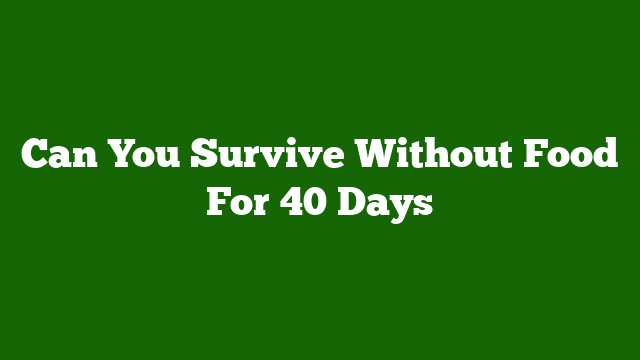Last Updated on June 12, 2023 by admin_hunter
The human body is a remarkable machine, capable of adapting to extreme conditions.
One such condition is the absence of food.
In this comprehensive blog post, we will explore the question: Can you survive without food for 40 days?
We will delve into personal stories, scientific research, and statistics to provide a detailed understanding of this fascinating topic.
Personal Experiences: Water Fasting and Soylent
Hasan Ozalp, a LinkedIn user, shared his experience of water fasting for 40 days
. During this time, he consumed only water and abstained from all food.
According to Ozalp, the absence of hunger can last up to 40 days, depending on the fast’s duration.
He found this stage easy, as he had trained himself for it.Another individual, Josh from The Hustle, experimented with living entirely off Soylent, a meal replacement drink, for 30 days. Although not a complete absence of food, this experiment demonstrates the human body’s adaptability to alternative sources of nutrition.
The Science Behind Surviving Without Food
According to CBC News, the human body can generally survive 30 to 40 days without food, as long as it is properly hydrated
. Medical Xpress also supports this claim, stating that humans can survive without any food for 30-40 days if they are well-hydrated.After eight hours without eating, the body begins to use stored fats for energy. This process, known as ketosis, allows the body to continue functioning without a constant supply of food.
The Importance of Hope
Hal Lindsey, an American evangelist, once said, “Man can live about forty days without food, about three days without water, about eight minutes without air…but only for one second without hope”
. This quote highlights the significance of mental fortitude and hope in overcoming extreme situations, such as prolonged periods without food.
Conclusion
While personal experiences and scientific research suggest that it is possible to survive without food for 40 days, it is essential to note that this is not a recommended practice.
The human body requires a balanced diet and proper hydration to function optimally.
However, these stories and insights demonstrate the incredible resilience and adaptability of the human body in extreme conditions.
Helpful Resources
- https://www.linkedin.com/pulse/how-i-did-40-21-days-water-fasting-some-my-insights-diet-hasan-ozalp
- https://thehustle.co/soylent-what-happened-when-i-went-30-days-without-food/amp/
- https://www.cbc.ca/news/canada/how-long-can-we-survive-without-food-or-water-1.1000898
- https://medicalxpress.com/news/2015-12-humans-survive-food.html
- https://www.discoverwalks.com/blog/world/how-many-days-can-you-go-without-food/
- https://www.goodreads.com/quotes/193469-man-can-live-about-forty-days-without-food-about-three
FAQs
What are some potential risks or dangers associated with going without food for an extended period of time?
Going without food for an extended period of time can have several potential risks and dangers.
Here are some of the possible complications and side effects:
- Slurred speech, confusion, syncope (fainting), or seizures.
- Bone loss and muscle weakness and wasting.
- Faintness, dizziness, cognitive changes, low blood pressure, slow heartbeat, weakness, dehydration, changes in thyroid function, abdominal pain, electrolyte imbalances, heart attack, and organ failure.
- Stunted growth and poor bone health or osteoporosis.
- Pancreatitis, or inflammation of the pancreas, which causes pain, nausea, and vomiting.
- Fatigue, gastrointestinal distress, nutrient deficiencies, and slowed metabolism.
- Increased risk for heart arrhythmias and hypoglycemia.
- Risk of developing an eating disorder.
Are there any medical conditions or factors that could affect a person’s ability to survive without food for 40 days?
There are several medical conditions or factors that could affect a person’s ability to survive without food for 40 days.
Here are some relevant points:
- Being underweight, defined as having a body mass index (BMI) below 18.5, can reduce the lifespan and make it harder for the body to function without food.
- Refeeding syndrome is a condition that can occur when someone who has experienced starvation begins to consume normal amounts of food again. The effects of refeeding syndrome may include heart conditions, neurological conditions, and swelling. To reintroduce food safely, people who have experienced starvation or malnourishment need to be cared for in a hospital or specialized medical facility.
- The duration of survival without food is greatly influenced by factors such as body weight, genetic variation, other health considerations, and the presence or absence of dehydration.
- In general, it is likely that a person could survive between 1 and 2 months without food. However, many different factors influence the length of time that the body can last without food, so this period will vary among individuals.
- It has been reported that some individuals could survive continual no-food fasting from 40 days or even more than a year.
- Prolonged fasting can result in specific diseases, like anemia when people don’t get enough iron or beriberi if they don’t get adequate thiamine.
What are some of the physiological changes that occur in the body during a prolonged fast?
Prolonged fasting can cause several physiological changes in the body, including:
- Increase in the concentration of growth hormone glucagon.
- Decrease in the blood levels of thyrotropin and T3/T4.
- Increase in the release and turnover of serotonin.
- Maintenance of blood glucose levels initially relies on glycogen stores in the liver and skeletal muscle.
- Decrease in carbohydrate oxidation and an increase in fat oxidation.
- Increase in the breakdown of amino acids (aka protein) from the muscle cells to help preserve muscle mass.
- Increase in the levels of hormones such as glucagon, epinephrine, growth hormone, and cortisol.
- Decrease in insulin levels and increase in ketone levels.
- Activation of cellular resistance to toxins and stress.
- Reduction in blood sugar, body weight, blood pressure, and belly fat, along with decreased hunger and improved feelings of physical and emotional well-being.

